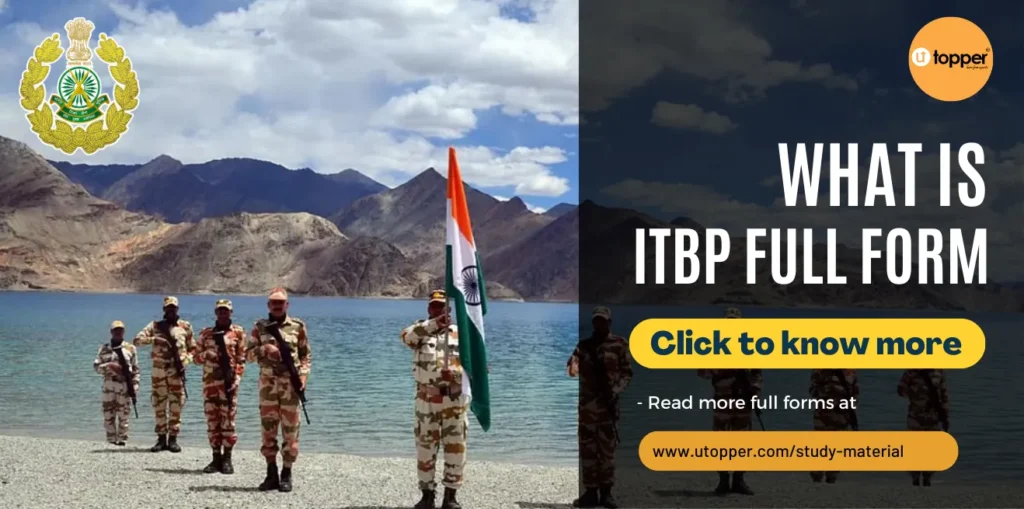ITBP FULL FORM: Know More About India’s Elite Paramilitary Force
ITBP FULL FORM: If you’re looking for information on ITBP, you’ve come to the right place. This article will provide you with a complete overview of ITBP, including ITBP Full Form, its history, functions, recruitment process, and other important aspects.
Read Other Full Forms

Introduction
ITBP stands for the Indo-Tibetan Border Police, which is India’s elite paramilitary force responsible for maintaining peace and security in the Indo-China border region.
ITBP is one of the five Central Armed Police Forces (CAPFs) in India. It was formed on 24th October 1962, in the wake of the Sino-Indian War, to guard the border between India and Tibet (which is now a part of China). ITBP is responsible for maintaining peace and security in the border region, and ensuring that there is no infiltration of terrorists or smugglers.
History of ITBP
ITBP has a rich history that dates back to the Sino-Indian War of 1962. The force was created to counter the threat posed by Chinese aggression on the Indian border. Since then, ITBP has played a vital role in safeguarding the country’s borders and has been involved in various military operations, including Operation Meghdoot, Operation Vijay, and Operation Blackboard.
Functions of ITBP
ITBP is primarily responsible for maintaining the law and order situation in the border region and preventing any kind of cross-border activities. Some of the major functions of ITBP include border guarding, intelligence gathering, disaster management, and VIP security. The force is also responsible for protecting vital installations and infrastructure in the border region.
ITBP’s Role in Indo-China Border Dispute
ITBP has played a crucial role in the ongoing border dispute between India and China. The force is deployed in various locations along the Line of Actual Control (LAC) and is responsible for maintaining peace and tranquility in the region. Despite the recent tensions between India and China, ITBP has been able to maintain a high level of professionalism and discipline.
ITBP’s Organizational Structure
ITBP is headed by a Director-General, who is responsible for the overall functioning of the force. The force is divided into six frontiers, each headed by an Inspector General. Each frontier is further divided into sectors, battalions, and companies.
Recruitment Process of ITBP
ITBP recruits personnel for various posts, including Constable, Head Constable, Assistant Sub-Inspector, Sub-Inspector, and Deputy Commandant. The recruitment process involves a written test, physical test, medical examination, and personal interview. The eligibility criteria vary for each post.
Training and Development of ITBP Personnel
ITBP places a strong emphasis on the training and development of its personnel. The force has its own training academy, which offers various training programs for its personnel. The training programs cover a wide range of subjects, including border management, disaster management, and combat training.
ITBP’s Role in Disaster Management
ITBP is also involved in disaster management activities and has played a crucial role in various natural disasters, including the Uttarakhand floods and the Nepal earthquake.
ITBP’s Awards and Recognitions
ITBP has received several awards and recognitions for its outstanding service to the nation. Some of the notable awards include the President’s Police Medal for Gallantry, the President’s Police Medal for Distinguished Service, and the Param Vishisht Seva Medal.
ITBP’s Contribution to Nation Building
ITBP has made significant contributions to nation-building, particularly in the border region. The force has played a crucial role in the development of infrastructure in the region, including the construction of roads, bridges, and border outposts. ITBP has also been actively involved in community development activities, including education and healthcare.
Challenges Faced by ITBP
ITBP faces several challenges in its role as a border guarding force. Some of the major challenges include harsh weather conditions, difficult terrain, and cross-border infiltration of terrorists and smugglers. The force also faces challenges in terms of recruitment and retention of personnel.
Future Prospects of ITBP
ITBP is expected to play an increasingly important role in the coming years, particularly in light of the ongoing border dispute with China. The force is likely to be provided with modern equipment and technology, and there may be an increase in the recruitment of personnel. ITBP is also likely to continue its focus on training and development, to ensure that its personnel are well-equipped to handle any challenges that may arise.
ITBP’s Social Media Presence
ITBP has a strong presence on social media platforms like Twitter and Facebook. The force uses social media to keep the public informed about its activities and achievements and to engage with the public on various issues.
Conclusion
In conclusion, ITBP is an elite paramilitary force that plays a crucial role in maintaining peace and security in the Indo-China border region. The force has a rich history and has made significant contributions to nation-building. Despite the challenges it faces, ITBP is well-equipped to handle any challenges that may arise in the future and is expected to play an increasingly important role in the coming years.
Frequently Asked Questions
Q.1 What is the full form of ITBP?
ITBP stands for Indo-Tibetan Border Police.
Q.2 What is the recruitment process for ITBP?
The recruitment process involves a written test, physical test, medical examination, and personal interview.
Q.3 What are the major functions of ITBP?
The major functions of ITBP include border guarding, intelligence gathering, disaster management, and VIP security.
Q.4 What is ITBP’s role in the Indo-China border dispute?
ITBP is responsible for maintaining peace and tranquility in the border region, and ensuring that there is no infiltration of terrorists or smugglers.
Q.5 What are the challenges faced by ITBP?
ITBP faces several challenges, including harsh weather conditions, difficult terrain, and cross-border infiltration of terrorists and smugglers.

